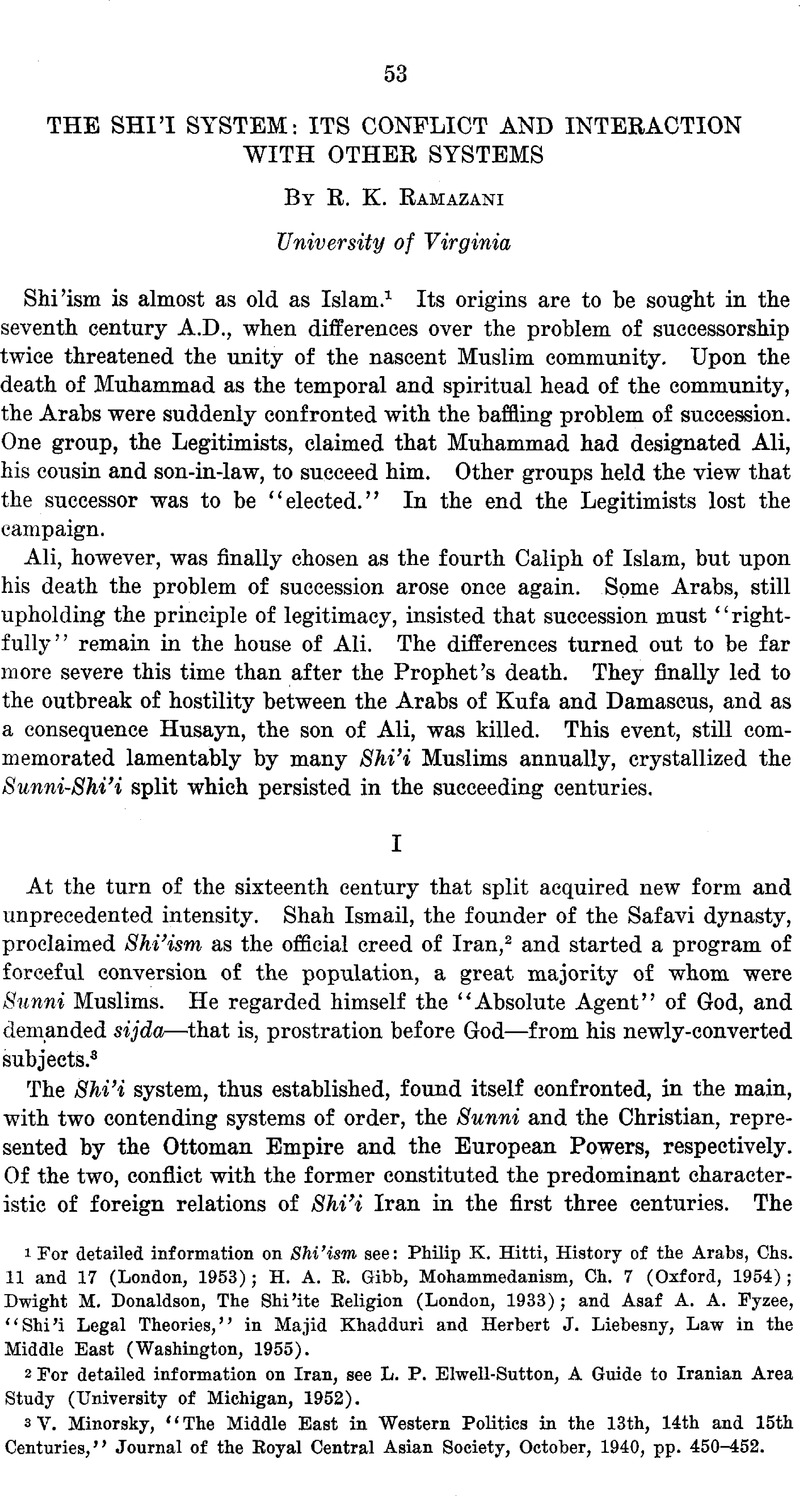No CrossRef data available.
Published online by Cambridge University Press: 27 February 2017

1 For detailed information on Shi'ism see: Philip K. Hitti, History of the Arabs, Chs. 11 and 17 (London, 1953); H. A. B. Gibb, Mohammedanism, Ch. 7 (Oxford, 1954); Dwight M. Donaldson, The Shi'ite Eeligion (London, 1933) ; and Asaf A. A. Fyzee, “Shi’i Legal Theories,” in Majid Khadduri and Herbert J. Liebesny, Law in the Middle East (Washington, 1955).
2 For detailed information on Iran, see L. P. Elwell-Sutton, A Guide to Iranian Area Study (University of Michigan, 1952).
3 V. Minorsky, “The Middle East in Western Politics in the 13th, 14th and 15th Centuries,” Journal of the Koyal Central Asian Society, October, 1940, pp. 450–452.
4 Ibid.
5 Ibid.
6 Lord Eversley, The Turkish Empire 106–107 (London, 1917).
7 For the text of the relevant treaty, see J. C. Hurewitz, Diplomacy in the Near and Middle East. A Documentary Becord: 1535–1914, pp. 21–23.
8 Peace lasted for eighty-three years.
9 L. Loekhart, Nadir Shah (London, 1938).
10 A satisfactory treaty was finally concluded in May, 1937, and ratifications were exchanged in July, 1939. For the text see 141 British and Foreign State Papers 1093–1099 (1937).
11 V. Minorsky, loc. cit. 453.
12 On this point see K. Bayani, Les Relations de l'Iran avee 1'Europe Occidental à l'Époque Safavide 10–14, 57–58 (Paris, 1937).
13 See the attractive privileges granted by Shah Abbas in a farman (Royal decree) in 1600. J. C. Hurewitz, op. cit. 15–16.
14 Russia first acquired such privileges under the Treaty of Turkomanchai in 1828. For the text see J. C. Hurewitz, op. cit. 96–102. These and similar extraterritorial privileges acquired by other Powers, following the example of Russia, were abolished in 1928 during the reign of Reza Shah.
15 For detailed information see: E. G. Brown, The Persian Revolution of 1905–1909 (Cambridge, 1910); Ahmad Kassravi, Tarikh Mashroteh Iran (Tehran, 1954), 2 vols.; and Mehdi Malakzadeh, Tarikh Enghelab Mashrotiat Iran (Tehran), 7 vols.
16 Art. 35. The text of the Supplementary Fundamental Laws of Oct. 7, 1907, is reproduced in Helen Miller Davis, Constitutions, Electoral Laws, Treaties of States in the Near and Middle East (Duke University, 1953).
17 Art. 26.
18 Art. 8.
19 Art. 9.
20 George N. Curzon, Persia and the Persian Question, Vol. 1, Ch. 14 (London, 1892).
21 E. G. Browne, “The Persian Constitutional Movement,” Proceedings of the British Academy (London, 1917–18), pp. 320–330.
22 Majmoah Usui Muhakemat Hoqoqi 10–11 (Tehran, 1952).
23 Ibid.
24 This question is raised in connection with the general theme “Diverse Systems of World Public Order Today” of the 1959 Annual Meeting of the American Society of International Law. More specifically, it is raised in relation to the broad hypotheses formulated by Myres S. McDougal and Harold D. Lasswell in “The Identification and Appraisal of Diverse Systems of Public Order,” 53 A.J.I.L. 1 (1959).
25 The pact with the United States was concluded on March 5, 1959. In the meantime Iran has “denounced” Arts. 5 and 6 of the Treaty of Friendship between Persia and the Eussian Socialist Federal Soviet Eepublie of Feb. 26, 1921. For the text of these long-disputed articles and the relevant exchanged notes, see the source cited in note 16 above, pp. 131–141. The denunciation is based, inter alia, on the ground of clausula rebus sic stantibus.